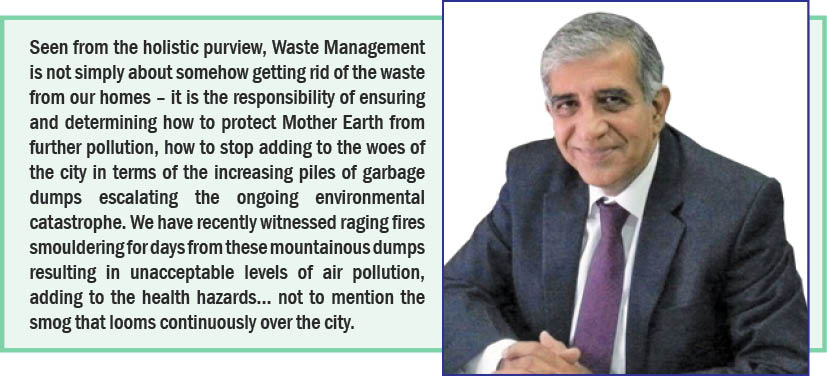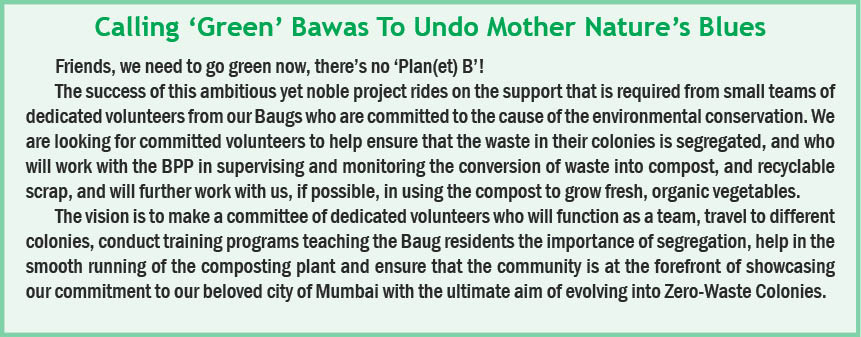
.
Our community has always been known to be at the forefront of answering the call of civic responsibility, especially when it comes to being sensitive towards our environment and the upkeep of the city. The Parsi/Irani Zoroastrian community has its belief firmly rooted in maintaining the sanctity of our natural elements – fire, air, water and earth. Contaminating or polluting the forces of nature is sacrilege to us.
And that is why, a couple of months ago, when the BMC announced its policy – that called for all large building complexes and households to manage the disposal of their own wet waste as it would not be collecting this waste anymore post 31st of December, 2017 – the BPP stepped in, taking the onus of managing the wet waste discharged from all its large colonies. In keeping with our moral, cultural, religious and civic principles as nature worshipping Zoroastrians, I thought this would be the perfect opportunity for us to come together as a Community and work towards repairing and restoring the faith that Mother Nature instilled in us.
 Togetherness yields wonders for our community and unity has a magical flavour to it – as they say, the whole is always greater than the sum of its parts. It is therefore, my privilege and responsibility, on behalf of my fellow Trustees, to invite my fellow community members to join our ‘Green’ initiative, which aims to recycle the disposed wet waste into compost or natural organic fertilizer (in Phase I), which will in turn help us grow pesticide-free natural produce (in Phase II)!
Togetherness yields wonders for our community and unity has a magical flavour to it – as they say, the whole is always greater than the sum of its parts. It is therefore, my privilege and responsibility, on behalf of my fellow Trustees, to invite my fellow community members to join our ‘Green’ initiative, which aims to recycle the disposed wet waste into compost or natural organic fertilizer (in Phase I), which will in turn help us grow pesticide-free natural produce (in Phase II)!
I must mention the laudable effort and enthusiasm shown by BPP CEO – Cawas Panthaky; Head of Projects – Bilal Baig; and Secretary, BPP Wadia Baugs – Percy Siganporia, who comprise the core Waste Management team, along with yours truly. Trustee Viraf Mehta has also been putting in time and effort towards this project, as best he can in keeping with his time constraints; and we also have, as usual, the solid support from Chairman Yazdi Desai and our fellow Trustees.
What started off as immensely confusing, in keeping with the plethora of literature and information that needed to be thoroughly scrutinized in order to make the right decisions, is now settling into a well thought-out plan that shows great potential of delivering upon the promise – ‘from garbage to green’.
The only honest and effective way forward was to use the natural method of ‘decomposting’ rather than numerous other short-cut solutions on offer, resulting in severely compromising on the nutritional value and quality of the compost. We now looked at two alternatives – Pit Composting and Tumbler Composting – the former being a difficult, time-consuming and extremely manual process, while the tumbler composting method is one of the more favoured ones – the effective way forward, subject to it being done scientifically and with honest dedication.
At this point I would like to acknowledge the highly fruitful and informative demonstration shown to us by Mr. Jayant Broker from Marathon Apartments (at Lower Parel), who has been passionately spearheading Tumbler Decomposting and dry waste segregation, at his personal apartment complex, over the last few years. We were fortunate to personally witness a live, effective and functioning system thanks to Mr. Broker facilitating our visit to the apartment complex. Numerous hours of studies and discussions later, we have finalised the plan for the way forward.
Since the initial plan was to set up small, independent composting units in each and every colony (that we were required to set up plants in, as per BMC guidelines), The Waste Management team, the solution provider and directors of D’ert, along with Trustee Viraf Mehta and myself, personally went visiting virtually every colony along the Western suburbs to South Bombay stretch, with the aim of identifying locations within the Baugs to set up these composting units. However, very early on, did we start getting complaints from frantic baug residents expressing their discontent and discomfort about the close proximity of the plant to their houses, despite assurances given by the Waste Mgmt Team that no nuisance would be created in terms of odour, pests or hygiene.
Even as the complaints were pouring in, a small idea had already started germinating about whether the BPP could consider building a Centralised Plant for waste disposal. After much deliberation, opting for a centralised plant slowly became a doable reality. To ensure that the BPP would not unintentionally overstep the law, we approached the BMC to share our views and include them as stakeholders in the project. The ensuing discussions with their senior officials proved to be an eye opener and the Waste Management Team was pleasantly surprised to meet so many officials seriously passionate and committed to the cause of Waste Management.
I am delighted to share with you that we are actively exploring the idea of converting our waste into compost and utilizing this compost in green patches across various colonies, and, if possible, even growing organic vegetables for community consumption. The compost will also be extensively used in our Doongerwadi land to help enrich the soil and rejuvenate the forest area. The Trust will also segregate the entire dry and wet waste and recover part of the cost by selling the dry waste scrap (barring medical and hazardous waste which will be handed over to BMC). This will help render our BPP Baugs into Zero-Waste Baugs over a period of time, even as our colonies will recycle the entire waste generated on a day to day basis.
.

.
- કેવો સુંદર જવાબ! - 29 March2025
- પારસી સન્નારીઓ તેમના જાદુઈ સ્પર્શ સાથે બની સુરત મેરિયોટ અથવા લાઇન્સના રસોડાની રાણીઓ - 29 March2025
- મોબેદ મેહરાબાન ફિરોઝગરીનું અવસાન - 29 March2025
